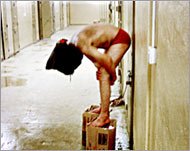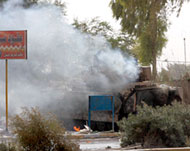Untitled Document
 |
Myers said he condemned the
Abu Ghraib abuse |
The Pentagon has moved forcefully to block the release of new video
evidence of prisoner abuse at Iraq's Abu Ghraib prison, arguing it would help
recruit new fighters and endanger American lives.
The request is contained in a motion filed in federal court by Joint Chiefs
of Staff Chairman General Richard Myers in response to a plea by several human
rights groups to make public 87 photographs and four videotapes made at Abu
Ghraib by Specialist Joseph Darby that thus far have been kept under wraps.
Darby triggered the Abu Ghraib scandal last year when he turned over to military
investigators extensive photographic and video evidence implicating his fellow
US soldiers in brutal, dehaminising abuse of Iraqi prisoners.
The pictures showed inmates piled up naked on the floor, cowering in front
of snarling military dogs, chained to beds in stress positions, with women's
underwear put over their heads, and forced to stand naked in front of female
guards.
At least eight low-ranking US soldiers have been convicted or voluntarily pleaded
guilty in the wake of the scandal that has sparked condemnation of the United
States all around the world.
US officials cleared
 |
The pictures showed the abuse
of Iraqi prisoners at Abu Ghraib |
A Pentagon probe has cleared all top US commanders of any criminal responsibility
in the matter.
But so far, only a fraction of pictures made by Specialist Darby have been
released to the public.
A lawsuit filed by the American Civil Liberties Union (ACLU) and several other
human rights groups with the US District Court in New York seeks to fill this
gap by making the remaining pictures available.
But in an affidavit filed with the court on 21 July and unsealed this past
week, Myers insists the release "would aid the recruitment effort and other
activities of insurgent elements".
He further states that should the pictures become public, they will "endanger
the lives and physical safety of the soldiers, sailors, airmen and marines in
the United States Armed Forces presently serving in Iraq and Afghanistan."
Sensitive time
The suit comes at a particularly sensitive time for the administration of President
George Bush, which is trying to stem the erosion of public support for its policies
in Iraq following a new spike in US casualties in that country.
As many as 61% of Americans expressed their disapproval of how the president
is handling Iraq in the most recent Newsweek magazine survey.
Myers says he personally condemns "in the strongest terms" the misconduct
and abuse depicted in the images.
But he argues the situation in Iraq is "dynamic and dangerous," with
US forces and their allies having to face on average 70 attacks a day mounted
by fighters who now number about 16,000.
US fear
 |
There are 70 attacks in Iraq
on an average each day, says experts |
The top US military commander also suggests the release of new photos could
have an effect similar to that caused by a since retracted Newsweek story about
the desecration of the Quran at the US detention centre at Guantanamo Bay, Cuba.
The story about the Muslim holy book being flushed down the toilet, which was
published in April, sparked riots in Afghanistan that, according to Myers, claimed
at least 17 lives.
But the general's arguments were sharply rebuffed by retired colonel Michael
Pheneger, a former classmate of Myers' at the US Army War College and intelligence
officer with experience in the Middle East.
Pheneger writes in court papers that Myers "mistakes propaganda for motivation."
"Insurgents average 70 attacks a day regardless of provocation as part
of their effort to achieve specific objectives," the intelligence expert
argues.
Meanwhile, ACLU Executive Director Anthony Romero insists the real reason the
Pentagon is fighting the release of the new evidence is because it demonstrates
"the failure of American leaders who placed our young men and women in
compromising situations and are now seeking to blame them for it".


